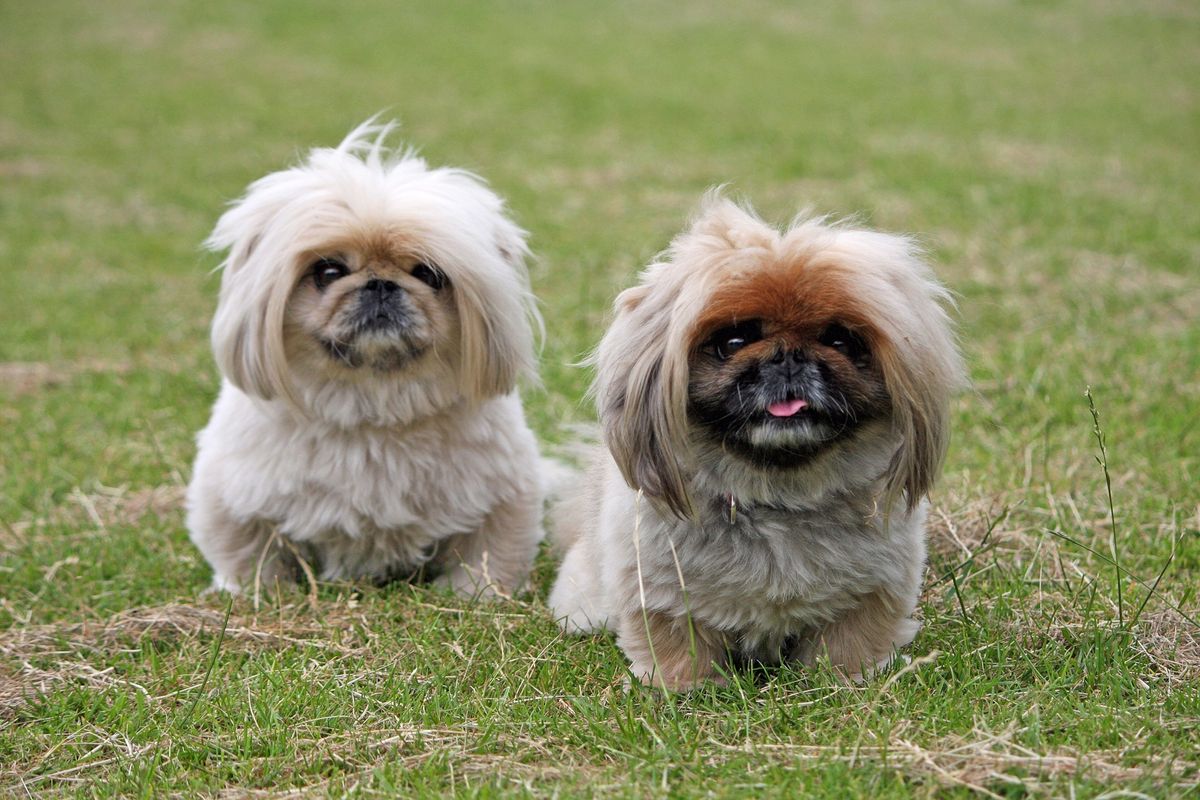Shih Tzus, with their friendly demeanor and beautiful coats, are beloved companions that require specific care when it comes to their diet and digestive health. Understanding their unique needs is essential for maintaining a happy and regular tummy. This article delves into the intricacies of Shih Tzu digestive health, offering practical tips for ensuring your furry friend is as healthy on the inside as they are adorable on the outside.
Key Takeaways
- High-quality proteins and prebiotics are crucial for Shih Tzu puppies to support their digestive system and promote optimal stool quality.
- Regular exercise tailored to the Shih Tzu’s breed and age can improve digestion and reduce issues like gas and bloating.
- Identifying and managing food intolerances with an elimination diet is key to a Shih Tzu’s digestive health and overall well-being.
- Nutrients such as EPA, DHA, and vitamin A not only contribute to a healthy coat but also support the skin’s role as a barrier, which is linked to digestive health.
- Optimal feeding practices, including slow-feeder bowls and appropriate meal frequency, can prevent digestive discomfort and support better nutrient absorption.
Understanding Shih Tzu Digestive Needs

The Importance of High-Quality Proteins
Proteins are the building blocks of your Shih Tzu’s body, crucial for growth, repair, and overall health. High-quality proteins are essential for maintaining muscle mass and supporting immune function. These proteins should be easily digestible and come from sources that are both safe and palatable for your pet.
- Animal-based proteins like chicken, lamb, or fish are often recommended for their amino acid profile, which is more suitable for dogs.
- Plant-based proteins such as soybeans and peas can supplement animal proteins but should be given in moderation.
It’s important to avoid foods with excessive chemical additives or fillers. A diet rich in high-quality proteins helps ensure your Shih Tzu’s digestive system runs smoothly, contributing to their overall well-being. When selecting treats or supplements, look for those that promote healthy skin and coat, as these can also have a positive impact on digestive health.
By focusing on nutritional support without sacrificing taste, you can provide your Shih Tzu with meals that are not only delicious but also contribute to a happy and regular tummy.
Prebiotics and Intestinal Flora Balance
Maintaining a healthy balance of intestinal flora is crucial for a Shih Tzu’s digestive health. Prebiotics are dietary fibers that feed the beneficial bacteria in the gut, promoting a robust digestive system. These non-digestible ingredients help to prevent gastrointestinal issues like diarrhea and enhance the immune system.
Incorporating foods rich in prebiotics such as soybeans, peas, and dairy products can be beneficial. It’s important to follow portioning recommendations closely and consult with your vet about the right balance of probiotics and prebiotics for your pet.
A well-balanced gut flora is essential not only for digestion but also for overall health, including healthy skin and coat.
Regular inclusion of prebiotics in your Shih Tzu’s diet can lead to noticeable improvements in digestion and metabolism. Additionally, probiotics can aid in restoring healthy gut functioning, especially after episodes of upset stomach or antibiotic treatments.
Nutritional Adequacy for Puppy Growth
Ensuring the nutritional adequacy of a Shih Tzu puppy’s diet is crucial for their development and future health. Proper growth and bone development require a diet that is 100% complete and balanced, meeting the standards set by authoritative bodies like the AAFCO. Puppies have different nutritional needs at various stages of their growth, which necessitates adjustments in their feeding regimen.
It’s important to note that while commercial foods often provide comprehensive nutrition, some puppies may thrive on alternative diets. Anecdotal evidence suggests that switching to a diet more suited to an individual puppy’s digestive system, such as raw food, can result in rapid weight gain and improved health.
Feeding recommendations vary based on the puppy’s age and target adult weight. Here is a simplified feeding guide for Shih Tzu puppies:
| Puppy Age (Months) | Target Adult Weight: 8.8 lb (4 kg) | Target Adult Weight: 11 lb (5 kg) | Target Adult Weight: 15 lb (7 kg) |
|---|---|---|---|
| 2 | 7/8 cup (80 g) | 1 cup (95 g) | 1 1/4 cups (115 g) |
| 3 | 1 cup (90 g) | 1 1/8 cups (107 g) | 1 1/2 cups (136 g) |
| 4 | 1 cup (95 g) | 1 1/4 cups (112 g) | 1 1/2 cups (144 g) |
| 5 | 1 cup (95 g) | 1 1/4 cups (113 g) | 1 1/2 cups (145 g) |
| 6 | 7/8 cup (86 g) | 1 1/8 cups (102 g) | 1 1/2 cups (144 g) |
| 7 | 7/8 cup (77 g) | 1 cup (92 g) | 1 3/8 cups (130 g) |
| 8 | 3/4 cup (68 g) | 7/8 cup (81 g) | 1 1/4 cups (117 g) |
As puppies transition to adulthood, it’s essential to gradually shift them to adult dog food to maintain optimal health. The transition should be done carefully to avoid digestive upset and ensure a smooth changeover to adult nutrition.
Optimizing Feeding Practices for Digestive Health

Benefits of Slow-Feeder Bowls
Slow-feeder bowls are an innovative solution to prevent Shih Tzus from gobbling up their meals too quickly, which can lead to a host of digestive issues. By encouraging a slower, more deliberate eating pace, these specialized bowls help promote better digestion and overall well-being for your Shih Tzu. They are designed with ridges or mazes that make it a bit more challenging for dogs to get to their food, turning mealtime into a stimulating activity.
Benefits of using slow-feeder bowls include:
- Reduced risk of choking and gagging
- Prevention of bloat, a serious and potentially life-threatening condition
- Enhanced mental stimulation during mealtime
- Improved digestion and nutrient absorption
When considering a slow-feeder bowl, it’s important to choose one that is appropriate for the size of your Shih Tzu and is made from safe, non-toxic materials. Additionally, ensure that the bowl is easy to clean to maintain hygiene and prevent any food-related illnesses.
Regular use of a slow-feeder bowl can make a significant difference in your Shih Tzu’s eating habits and digestive health. It’s a simple yet effective tool to enhance your pet’s daily routine and contribute to a happier, healthier life.
The Role of Meal Frequency and Size
The meal frequency and size for a Shih Tzu can significantly impact their digestive health. Smaller, more frequent meals are often recommended to prevent overloading the digestive system and to maintain a steady energy level throughout the day. This approach can also help in managing weight, as it prevents the intense hunger that can lead to overeating.
- Puppy (under 6 months): 3-4 meals per day
- Adult (1-7 years): 2 meals per day
- Senior (over 7 years): 2-3 meals per day, depending on health
Adjusting meal size according to activity level and life stage is crucial. For instance, an adult Shih Tzu will typically eat about one cup of food per day, but this can vary based on individual needs and activity levels. It’s important to avoid the common mistake of not considering the unique needs of the breed, life stage, or activity level.
When transitioning to a new feeding routine, it’s essential to monitor your Shih Tzu’s response closely. Changes in appetite or stool consistency can indicate the need for further adjustments.
Transitioning to Adult Dog Food
Transitioning your Shih Tzu to adult dog food is a critical step in ensuring their long-term health and digestive well-being. It’s essential to make this change gradually to avoid upsetting your pet’s stomach. Start by mixing a small amount of adult food with the puppy food, and slowly increase the proportion over 7-10 days until you’re only serving adult food.
When changing your Shih Tzu’s diet, it’s important to monitor their reaction to the new food. Look for signs of digestive discomfort such as reduced appetite, vomiting, or changes in stool consistency.
Here’s a simple transition schedule you can follow:
- Day 1-3: 75% puppy food, 25% adult food
- Day 4-6: 50% puppy food, 50% adult food
- Day 7-9: 25% puppy food, 75% adult food
- Day 10: 100% adult food
Remember, each dog is unique, and some may require a longer adjustment period. Consult your veterinarian if you notice any adverse reactions or if your Shih Tzu is particularly sensitive to dietary changes.
The Link Between Exercise and Digestion

Appropriate Activity Levels for Shih Tzus
Shih Tzus may be small, but they still require regular exercise to maintain good digestive health. The suggested amount of exercise for small breeds like Shih Tzus is usually 30-40 minutes a day. This can be split into two sessions to keep them engaged and prevent boredom.
While they may not need as much exercise as larger breeds, it’s important to tailor activities to your Shih Tzu’s individual needs and health status.
Adequate exercise for Shih Tzus not only supports their digestion but also contributes to their overall well-being. Here’s a simple guideline to help you plan your Shih Tzu’s exercise routine:
- Short walks in the morning and evening
- Playtime with toys or other interactive games
- Training sessions to stimulate their mind
- Gentle play with other dogs to encourage socialization
Remember to always monitor your Shih Tzu during exercise, especially in hot or humid weather, as they can be prone to overheating due to their flat faces.
Exercise as a Remedy for Gas and Bloating
Regular exercise is not only beneficial for a Shih Tzu’s overall health but also plays a crucial role in maintaining digestive health. Moderate, consistent activity can significantly reduce the incidence of gas and bloating by stimulating intestinal motility, which helps in the efficient processing and movement of food through the digestive tract.
- Ensure your Shih Tzu gets daily exercise tailored to their age and physical capabilities.
- Incorporate a variety of activities such as walking, playing fetch, or agility training to keep them engaged.
- Observe your pet for any signs of discomfort during exercise and adjust accordingly.
While exercise is important, it’s also essential to recognize that overexertion can be counterproductive. Finding the right balance is key to promoting a happy and regular tummy.
Remember, a sedentary lifestyle can lead to sluggish digestion, contributing to gas buildup and discomfort. By integrating regular exercise into your Shih Tzu’s routine, you can help alleviate these symptoms and support their digestive health.
Integrating Play and Exercise into Daily Routine
Incorporating play and exercise into your Shih Tzu’s daily routine is essential for maintaining their digestive health. Regular activity not only stimulates digestion but also helps manage weight and reduce stress, which can have a positive impact on gut function. To seamlessly blend exercise into your dog’s day, consider activities that align with your own routine. For example, if you’re doing yoga, encourage your Shih Tzu to join you on the mat for some calming stretches.
By integrating play into activities you already enjoy, you can ensure your Shih Tzu gets the exercise they need without it feeling like a chore for either of you.
Here are some simple ways to include your Shih Tzu in your daily exercise routine:
- Use them as a gentle weight during wall sits or planks.
- Bring them along for a brisk walk or jog.
- Play fetch or tug-of-war during your outdoor workout breaks.
- Schedule short play sessions throughout the day to keep them active.
Remember, the goal is to create a fun and engaging environment that encourages your Shih Tzu to move more, promoting a healthy and regular digestive system.
Identifying and Managing Food Intolerances

Common Symptoms of Food Intolerances
Shih Tzus, like all dog breeds, can suffer from food intolerances that manifest in various ways. Recognizing the signs early is crucial for managing your pet’s comfort and health. Symptoms can range from gastrointestinal issues to skin reactions.
- Vomiting
- Diarrhea
- Itchy skin
- Chronic ear infections
- Gastrointestinal upset and gas
These symptoms can be distressing for both the dog and the owner. It’s important to note that while some signs are immediate, others may develop over time. If you observe any of these symptoms, it’s advisable to consult with your veterinarian. They may suggest an elimination diet to pinpoint the exact cause of the intolerance.
Remember, maintaining a healthy weight is also key in reducing the risk of food intolerances and ensuring your Shih Tzu’s digestive system functions properly.
How to Conduct an Elimination Diet
An elimination diet is a methodical approach to identifying food intolerances in your Shih Tzu. Begin by choosing a novel protein and carbohydrate source that your dog has never eaten before. This could be a protein like duck or venison, paired with a carbohydrate such as sweet potato or peas. During the elimination phase, these should be the only food sources for your dog, aside from water.
Follow these steps to ensure a successful elimination diet trial:
- Remove all other food sources, including treats and flavored medications.
- Feed the novel diet exclusively for 8-12 weeks.
- Monitor your dog’s symptoms closely throughout the trial.
- Gradually reintroduce other foods one at a time, observing for any adverse reactions.
Remember, patience is key during an elimination diet. It can take several weeks for symptoms to improve, so it’s important to stick to the diet strictly and avoid any slip-ups that could skew the results.
Choosing Hypoallergenic Dog Foods
When selecting a hypoallergenic diet for your Shih Tzu, it’s crucial to identify and avoid common allergens for dogs such as wheat, corn, soy, or chicken. These ingredients are often implicated in allergic reactions and can cause discomfort or health issues for sensitive dogs.
Hypoallergenic dog foods are specifically formulated to reduce the risk of allergic reactions. They typically contain novel protein sources and limited ingredients to minimize the potential for intolerance.
Here is a list of steps to consider when choosing the right hypoallergenic food for your Shih Tzu:
- Read the label carefully to ensure the food does not contain common allergens.
- Look for foods with novel protein sources, such as venison or duck, which are less likely to cause allergic reactions.
- Consider foods with a single protein source to easily identify and eliminate potential allergens.
- Consult with your veterinarian to select a food that meets your Shih Tzu’s specific dietary needs.
Supporting Skin Health to Enhance Digestive Function

Nutrients That Benefit Skin and Digestion
A Shih Tzu’s radiant coat and smooth digestion are influenced by a variety of nutrients. Fatty acids, such as omega-3 and omega-6, are essential for reducing inflammation and promoting a shiny coat. These nutrients also play a role in maintaining a healthy digestive system.
Vitamins are also vital, with Vitamin E and Vitamin A being particularly important for skin health. They help protect the skin barrier and ensure the skin’s role as a barrier is optimized. For digestive health, Vitamin C is not only an immune booster but also crucial for gut function.
Probiotics and prebiotics contribute significantly to a balanced intestinal flora, which is key for optimal stool quality and overall digestive health.
Including a variety of these nutrients in your Shih Tzu’s diet can lead to noticeable improvements in both skin condition and digestive regularity.
The Skin-Gut Connection
The intricate relationship between your Shih Tzu’s skin health and digestive function is pivotal for their overall well-being. A healthy gut microbiome is essential for a robust immune system, which in turn can lead to a lustrous coat and resilient skin. Conversely, digestive disturbances can manifest externally, causing skin irritations and a dull coat.
Sometimes, your Shih Tzu’s diet may need a little boost to support their digestive health. Probiotics and digestive enzymes can help maintain a healthy balance and improve nutrient absorption, which is beneficial for both skin and gut health.
Incorporating specific nutrients into your Shih Tzu’s diet can have a synergistic effect on their skin and digestive health:
- Omega-3 fatty acids: Reduce inflammation and promote a shiny coat.
- Vitamins: Essential for skin repair and gut lining integrity.
- Probiotics: Support a balanced intestinal flora and enhance immune function.
Understanding this connection allows you to make informed choices about your Shih Tzu’s diet and care, ensuring they not only look great but feel great too.
Maintaining a Healthy Coat for Overall Well-being
A Shih Tzu’s coat is more than just a matter of aesthetics; it’s a mirror of their internal health. Ensuring a lustrous and healthy coat is indicative of a well-functioning digestive system. Nutrients like EPA, DHA, and vitamin A are pivotal in promoting the growth of a long, beautiful coat while also supporting skin health.
To maintain a healthy coat that reflects your Shih Tzu’s inner health, consider incorporating the following into their diet:
- Omega-3 fatty acids (EPA, DHA) for inflammation reduction and coat shine
- Vitamin A for skin barrier support
- High-quality proteins for coat growth
- Prebiotics for a balanced intestinal flora
A balanced diet enriched with these nutrients not only enhances the coat’s appearance but also fortifies the skin’s role as a barrier against environmental stressors.
Regular grooming and the right nutrition go hand in hand in maintaining your Shih Tzu’s coat health. It’s not just about the right shampoo or brushing technique; it’s also about what goes into their body. A diet deficient in essential nutrients can lead to a dull coat, skin irritations, and overall discomfort for your pet.
Conclusion
In conclusion, ensuring the digestive health of your Shih Tzu requires a combination of proper nutrition, regular exercise, and attention to their unique dietary needs. By choosing a diet formulated specifically for Shih Tzus, like Royal Canin Shih Tzu Puppy dry dog food, you provide your furry friend with the essential nutrients needed for a healthy digestive system and overall well-being. Remember to monitor for food intolerances, practice good feeding habits, and keep your Shih Tzu active. With these tips, your Shih Tzu’s tummy will be as happy and regular as their delightful personality.
Frequently Asked Questions
What type of diet is best for my Shih Tzu’s digestive health?
A diet rich in high-quality proteins and prebiotics is ideal for Shih Tzus, supporting digestive health and promoting optimal stool quality. Look for foods formulated for Shih Tzus, like Royal Canin Shih Tzu Puppy dry dog food, which is designed to meet their specific nutritional needs.
How can I help my Shih Tzu transition to adult dog food?
When your Shih Tzu puppy is over 10 months old, gradually introduce adult dog food over a period of 7-10 days to prevent digestive upset. This will help them adjust to the new diet without causing any stomach issues.
What are the benefits of using a slow-feeder bowl for my Shih Tzu?
Slow-feeder bowls can prevent your Shih Tzu from eating too quickly, which reduces the risk of swallowing too much air and helps ease digestion. It can also make mealtime more challenging and mentally stimulating for your dog.
How can I tell if my Shih Tzu has a food intolerance?
Common symptoms of food intolerances in Shih Tzus include gastrointestinal issues like diarrhea or vomiting, as well as skin irritations. If you suspect a food intolerance, consult your vet and consider an elimination diet to identify the culprit.
What role does exercise play in my Shih Tzu’s digestive health?
Regular exercise helps improve digestion and reduce gas in Shih Tzus. Ensure your dog gets appropriate activity levels based on their breed and age, which can also contribute to their overall well-being.
How does skin health affect my Shih Tzu’s digestion?
The skin and gut are interconnected, and a healthy skin barrier supported by nutrients like EPA, DHA, and vitamin A can reflect and enhance your Shih Tzu’s digestive health. A balanced diet that promotes a healthy coat can contribute to a happy and regular tummy.




